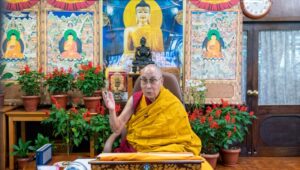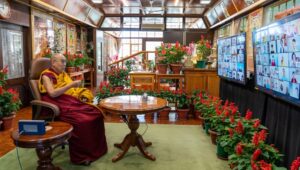
On August 11, 2021
Photo : Ven Tenzin Jamphel
His Holiness the 14th Dalai Lama, the spiritual leader of Tibetans and Buddhists across the world, is keeping in touch with his followers through virtual teachings from his residence in Dharamshala. This month, His Holiness gave three teachings on different topics,each requested by a different group of people.
During the first teaching, which took place on August 11, His Holiness held a virtual discussion with over one thousand Indonesian students on the theme of the Jataka Tales – the stories of the Buddha’s previous lives from the book of Jatakamala or Garland of Birth Stories. The Jatakamala stories teach perfections, generosity, ethics and patience, and the Bodhisattva. His Holiness explains that underlying all the stories are the ancient Indian concepts of karuna and ahimsa —compassion and doing no harm. “These themes are common to most religions, but whether we follow a religious tradition or not, we all need to be warm-hearted and compassionate if we want to be happy,” said His Holiness.
A student asked how to deal with negativity; His Holiness advised holding to the moral principles of honesty and compassion. His Holiness shared the difficulties he has faced in his own life, in Tibet and later as a refugee, saying that he has kept up his practice according to the Nalanda Tradition that Shantarakshita introduced in Tibet. His Holiness emphasised that the key point of the Jataka Tales is to acknowledge the oneness of humanity; to recognise that we are all the same in being human saying that from a practical point of view, we are all dependent on each other and we can serve one another on that basis.
His Holiness explained that one of the qualities of Buddhism is that it takes in the scientific view of our minds and emotions and is able to explain ways to achieve peace of mind, it also teaches methods to reduce negative emotions and increase those that are positive. His Holiness concluded the discussion with advice to his listeners to share the idea of loving-kindness and encouraged them to develop the human qualities of compassion and forgiveness, saying this will create a more harmonious, compassionate society. The potential for compassion is something all human beings have in common, he said, it’s the basis for mutual respect and being able to learn from one another.

His Holiness the Dalai Lama speaking to the virtual audience on August 18, 2021.
Photo : Ven Tenzin Jamphel
The second teaching, on August 18, was at the request of the members of Labsum Shedup Ling Dharma Centre in South Koreawho attended the online teaching on Compassion and Non-violence.
His Holiness started by explaining that Buddhism as it spread in Tibet was established by Shantarakshita on the basis of the Nalanda Tradition – the tradition that His Holiness himself has studied as a monk. He reflected on what he has understood and experienced during meditation, and stressed that his teaching would be based on that experience.
His Holiness reiterated his message that all the different religious traditions, ideas and philosophical approaches in the world emphasise the importance of cultivating love, compassion and non-violence.
Speaking about the liberation of fellow beings from suffering he said, “the Buddhas do not wash unwholesome deeds away with water,” and continued, saying that it is only through the teaching of truth that beings can be liberated from suffering. His Holiness said that the Buddhas first generate the awakening mind of bodhichitta. Having accumulated the two collections (of merit and wisdom), they attain enlightenment and then share their experience with sentient beings. It is on this basis that the Buddha stated, “You are your own master.” Whether or not you choose to engage in the practice of Dharma is in your hands.
His Holiness also emphasised that the root of suffering is the unruly mind, and the practice of Dharma is to transform the mind. Citing his own experience he said, “over the decades that I have studied the Dharma and applied what I understood, I’ve seen a transformation in myself”.
His Holiness spoke of the four noble truths, of suffering and causes, and emptiness, and then explained verses from Chandrakirti’s Entering into the Middle Way and Nagarjuna’s Root Wisdom of the Middle Way.
His Holiness answered a wide range of questions from his online audience. Answering a question on how to keep good family relations in the context of different religious traditions, he advised that we are all the same in being human and that what is most important is to cultivate a warm heart, maintain close contact and to help one another. To cope with children feeling angry with their parents, His Holiness advised consultation of Shantideva’s Entering into the Way of a Bodhisattva saying that chapter six gives explicit guidance about the disadvantages of anger and learning to deal with it, while chapter eight extols the advantages of cultivating an altruistic attitude.
On August 25, His Holiness gave his third teaching of the month, speaking on the topic of Tibetan Culture and Its Potential to Contribute to Peace, as requested by Tibet Initiative Deutschland (TID), a Tibet Support Group in Germany.




 Print
Print Email
Email